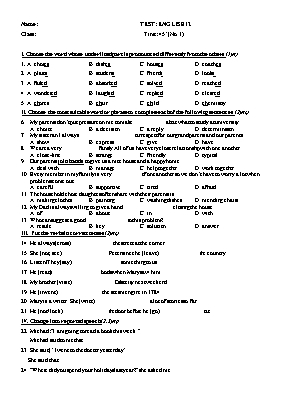Đề kiểm tra 1 tiết số 1 môn Tiếng Anh Lớp 12
Bạn đang xem tài liệu "Đề kiểm tra 1 tiết số 1 môn Tiếng Anh Lớp 12", để tải tài liệu gốc về máy bạn click vào nút DOWNLOAD ở trên

Name: TEST: ENGLISH 12 Class: Time: 45’ (No.1) I. Choose the word whose underlined part is pronounced differently from the others (1pt) 1. A. chores B. dishes C. houses D. coaches 2. A. plates B. students C. friends D. looks 3. A. failed B. absorbed C. solved D. reached 4. A. wondered B. laughed C. replied D. cleaned 5. A. chores B. chair C. child D. chemistry II. Choose the most suitable word or phrase to complete each of the following sentences. (2pts) My parents don’t put pressure on me to make .about what to study at university. A. choice B. a decision C. a reply D. determination My sister an I always .our respect for our grandparents and our parents. A. show B. express C. give D. have We are a very family. All of us have very close relationship with one another. A. close-knit B. strange C. friendly D. typical Our parents join hands to give us a nice house and a happy home. A. deal with B. manage C. help together D. work together Every member in my family is very of one another so we don’t have to worry a lot when problems come out. A. careful B. supportive C. tired D. afraid The household chore daughters often share with their parents is .. A. making clothes B. painting C. washing dishes D. mending chairs My Dad is always willing to give a hand .cleaning the house. A. of B. about C. in D. with Who can suggest a good to this problem? A. result B. key C. solution D. answer III. Put the verbs in correct tenses (2pts) He always (cross) the street at the corner. She (not, see). Peter since he (leave) the country. Listen! They (say).. something to us. He (read) books when Mary saw him. My brother (visit).Dalat city next weekend. He (invent) the steam engine in 1784. Mary is a writer .She (write) ..a lot of stories so far. He (not/ lock)the door before he (go)..out. IV. Change into reported speech (2.5pts) Michael: "I am going to read a book this week." Michael said to me that She said, “I went to the doctor yesterday.” She said that "Where did you spend your holidays last year?" she asked me. She asked me "Did you see that car?" he asked me. He asked me. 26. "Can you meet me at the station?" she asked me. She asked me V. Read the passage carefully, then choose the correct answer. (2.5 pts) Greetings in all languages have the same purpose: to establish contact with another person, to recognize his or her existence and to show friendliness. The formulas for greeting are very specific and usually do not carry any literal meaning people say “ Good morning “even if it is a miserable day and may reply to “How are you?” with “Fine, thanks” even if they aren’t feeling well. Closings, like greeting s are commonly used to exchange with no literal meaning. People who are leaving each other permanently or for a long time shake hands or embrace, depending on the relationship. If you are in an unfamiliar situation and wonder what to do. Watch other people or ask. It is interesting, and sometimes very important to learn about the standards of courtesy in different cultural areas of the world so that we can practice them well and avoid awkwardness in case we get a chance to visit a person or a community of unfamiliar social customs. 1. Which of the following is NOT mentioned in the passage as a purpose of greetings? A. To show that you admire him or her. B. To show that you recognize his or her present C. To create contact with the person being greeted. D. To show that you are willing to be his or her friend. 2. Which of the following is a characteristic of the formulas for greeting? A. usual B. common C. literal D. specific 3. In what way are closings similar to greeting? A. They are exchanges B. They are common C. They have no literal meaning D. They are familiar 4. According to the passage, what should you do when you are in an unfamiliar situation? A. Use formulas you know. B. Observe what other people do C. Ask your friends for help D. Wonder what you should do 5. Which of the following is a benefit of learning about the standards of courtesy in a different cultural area? A. You can avoid meeting with a community of unfamiliar social customs B. You can act comfortably hen you have a chance to visit the community C. You can have a chance to visit a community of unfamiliar social customs D. You can practice meeting with people from different cultural areas
Tài liệu đính kèm:
 de_kiem_tra_1_tiet_so_1_mon_tieng_anh_lop_12.doc
de_kiem_tra_1_tiet_so_1_mon_tieng_anh_lop_12.doc





